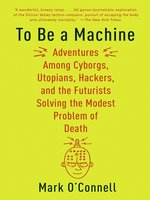-

November 7, 2016
Transhumanism—defined here as “a liberation movement advocating nothing less than a total emancipation from biology itself”—is scrutinized in this compact, provocative exploration of the techniques and technologies currently being advanced to extend human intelligence and life spans. Slate columnist and debut author O’Connell takes an open-minded but skeptical approach to his subject as he leads the reader on a tour of modern facilities devoted to enhancing the human “meat machine”: cryonics storehouses that freeze brains and bodies for future resuscitation, whole-brain emulation labs studying the scanning and uploading of human consciousness, robotics researchers attempting to create simulacra capable of human function, cyborg “grindhouses” crafting renegade interfaces between the body and smart technology, and gerontology institutions that are trying to “cure” aging. O’Connell writes with an intellectual curiosity that makes his esoteric subject matter accessible to lay readers, and he tempers his observations with the existential anxiety that the concept of transhumanism evokes, as when he describes it as “an expression of the profound human longing to transcend the confusion and desire and impotence and sickness of the body, cowering in the darkening shadow of its own decay.” His book is a stimulating overview of modern scientific realities once thought to be the exclusive purview of science fiction. Agent: Amelia Atlas, ICM Partners.
-

December 15, 2016
An enlightening tour of transhumanism, the movement dedicated to radically prolonging human life. In his first book, Slate book columnist and Millions staff writer O'Connell chronicles his travels around the world meeting and discussing transhumanism with the movement's aficionados. The narrative is packed with eccentric characters, but none subscribe to the far more popular commercial life-extension industry that promises immediate results. On the contrary, transhumanists aim to achieve their goals through genuine technical advances, including implants, genetic modification, prostheses, mind-uploading, and biohacking. Those who feel they've been born too soon will perk up at O'Connell's early chapter on Alcor, a cryopreservation facility where technicians will, for $200,000, carefully freeze your body upon death (just your head runs $80,000) and keep it until thawing, revival, and reconditioning become feasible options. Most governments and universities refuse to finance research aimed at immortality, but Silicon Valley billionaires, among others, are less inhibited. As such, O'Connell turns up plenty of freelancers with legitimate scientific backgrounds working on the problem as well as websites (Maxlife.org), organizations (Humanity Plus, described on its website as advocating "the ethical use of emerging technologies to enhance human capacities"), and even venture capital firms (Longevity Fund). Elderly readers may gnash their teeth, but others will have hope since many experts predict breakthroughs within decades. O'Connell does not claim to be impartial. He lets spokesmen have their say, explains their science for a lay audience, and does not conceal his amusement at wacky enthusiasts or his dismay at gruesome self-experiments. He also detours into robotics and artificial intelligence, which, once computers become smarter than humans, may render our perishable bodies irrelevant. Skeptics deliver thoughtful warnings, and O'Connell himself waxes hot and cold. An unsettling but informative and sometimes-optimistic view of mostly legitimate efforts at life extension.
COPYRIGHT(2016) Kirkus Reviews, ALL RIGHTS RESERVED.
-

December 1, 2016
O'Connell, Slate's book columnist and contributor to the New York Times Magazine, the New Yorker, the Observer, and the Independent, writes pensively on the growing movement of transhumanism, the use of technology to enhance human physical, mental, and intellectual developments. O'Connell investigates this movement through his travels across the globe, from San Francisco to London, to meet with transhumanists in their homes, conferences, informal gatherings, and labs. From device implants to human cyborgs, O'Connell weaves his journey together via a series of encounters and discussions with transhumanists. Readers will appreciate O'Connell's sense of humor and his fast-paced writing, and will at times feel like they're having a dialogue with the author as he ponders the ethics, consequences, and dilemmas of these transhumanist activities embedded in society today. Those who are interested in artificial intelligence, bioengineering, technology, and human development will find this book to be deeply engrossing and informative on the topic of transhumanism and what it means to be a human today and in the future.(Reprinted with permission of Booklist, copyright 2016, American Library Association.)
-
Jeanette Winterson, Vulture
"Troubling and humorous, this is one of my current give-it-to-everyone books--I buy six copies at a time. Did you know our future belongs to a few asocial geeks for whom being human has always been a problem? Now they can solve it!"
-
LA Review of Books
"Open-minded... With a practiced journalist's sense of engagement and empathy leavened by healthy skepticism, O'Connell describes the peculiar constellation of scientists, seekers, grifters, and con artists orbiting techno-optimist communities over the past half century.... Offer[s] much-needed critical analysis that never veers into condescension."
-
NPR's 13.7 blog
"O'Connell decides to dive into the transhumanist culture in the best way possible: by traveling the world in search of key figures in the movement... The result is a fast-paced travel-log-cum-existential inquiry into the science and the religious significance of this age-old human desire to live forever: To become, in effect, a god."
-
Science
"O'Connell, a journalist, makes his own prejudices clear: 'I am not now, nor have I ever been, a transhumanist,' he writes. However, this does not stop him from thoughtfully surveying the movement."







